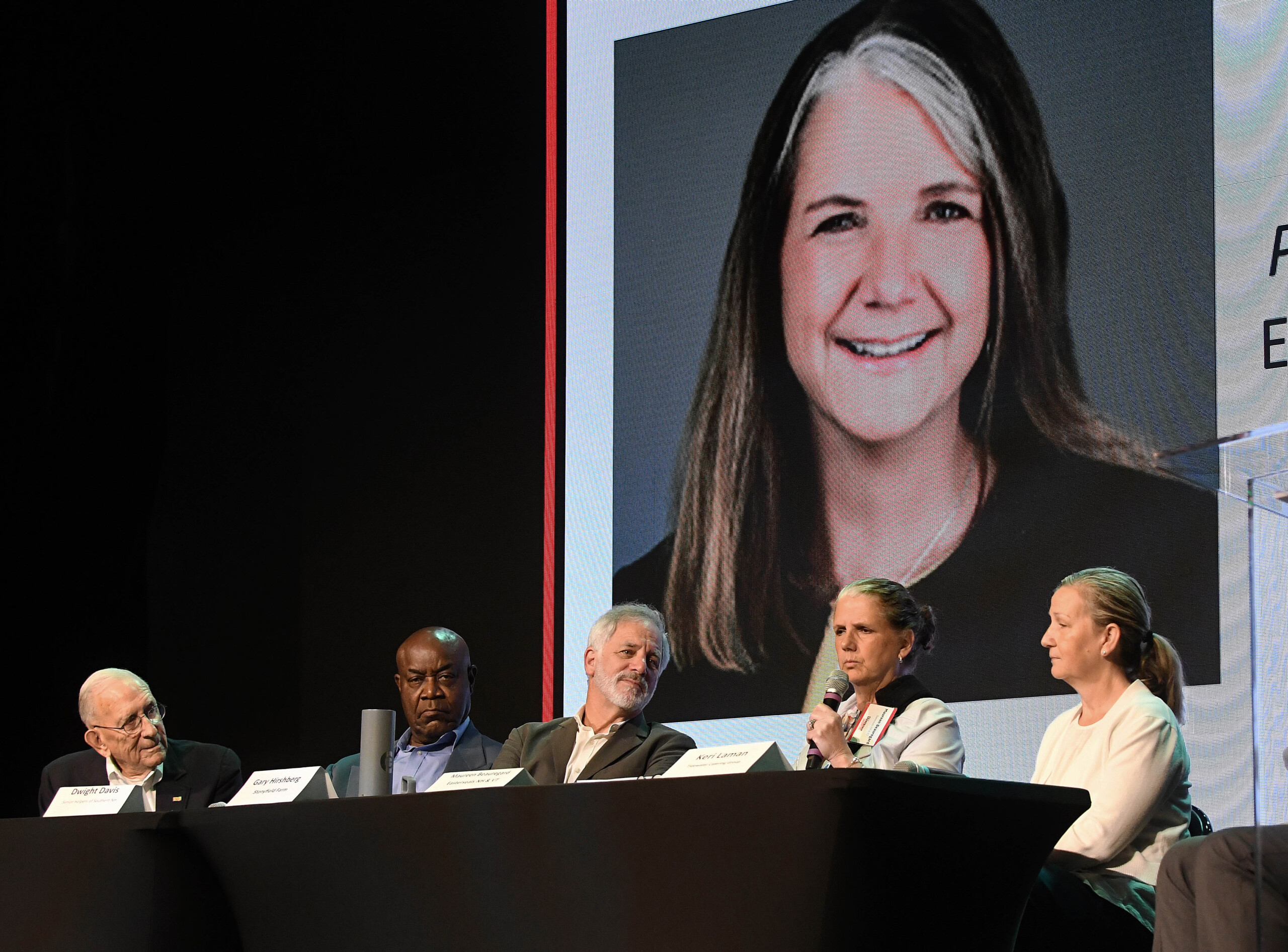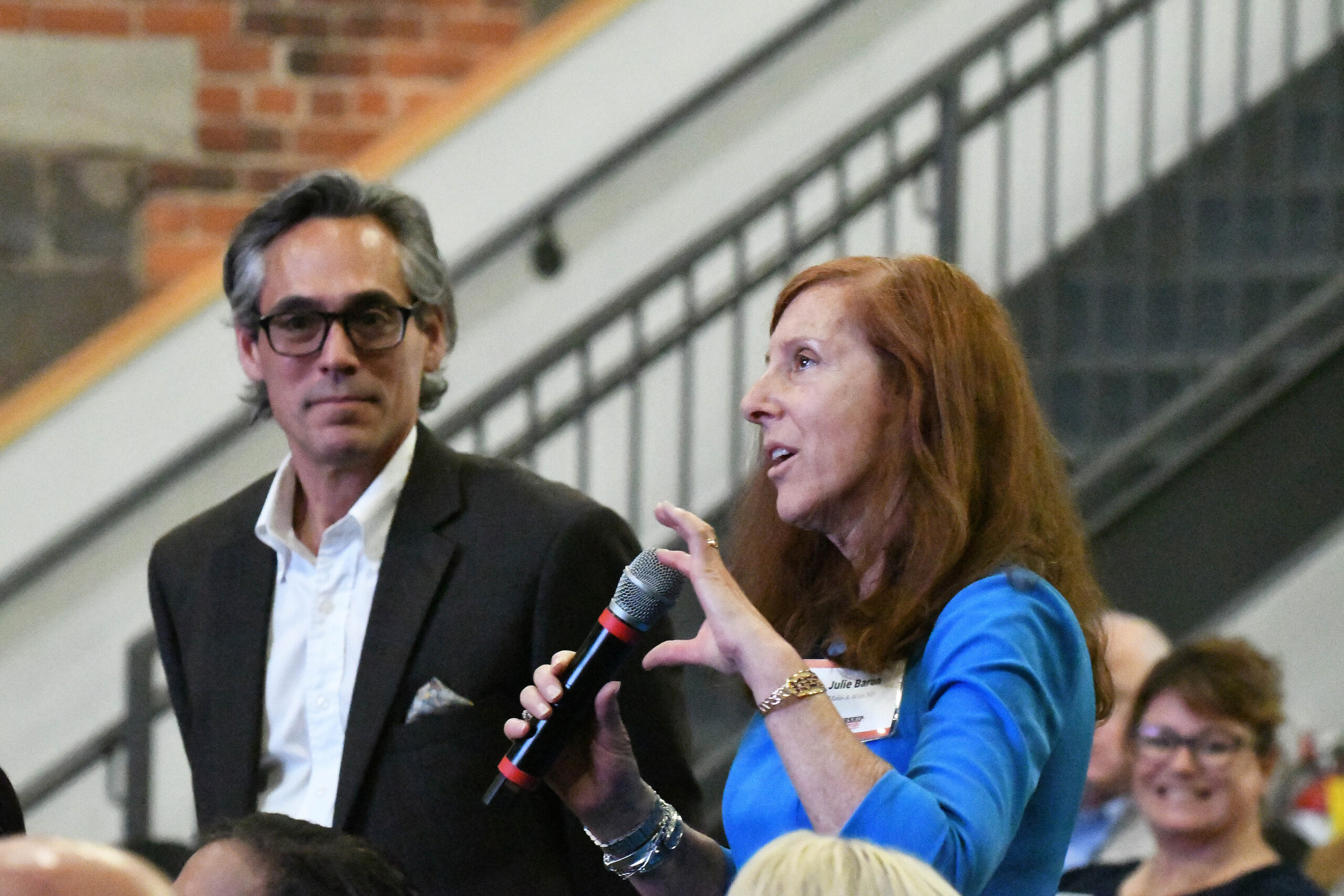5 business executives openly discuss company stories

What do you get when you cross five business leaders of different sectors together with a stage and no script? Talk of basketball stardom, 19 cows and the campaign staff of a former Manchester mayor — all separate discussion points, of course.
Those came up in NH Business Review’s Leadership Unscripted event, as five executives candidly recounted their careers and leadership experiences under the limelight of the Queen City’s Rex Theatre. NHBR Editor Mike Cote moderated the panel, first having each speaker share their professional stories followed by questions from the audience.
The panelists were Jack Middleton, president of law firm McLane Middleton, P.A.; Dwight Davis, president of Senior Helpers of Southern NH; Gary Hirshberg, co-founder and chief organic optimist of Stonyfield Farm; Maureen Beauregard, president and CEO of Easterseals NH & VT; and Keri Laman, president of Tidewater Catering Group.
Implying that Middleton and Laman have more in common for leadership skills than they think despite disparate careers, Karl Dubay, president of The Dubay Group, opened with a greeting message emphasizing kinship between job sectors.
“Teaming is everything,” Dubay said. “As we get older, we master whatever we’re doing and we have fun doing it. I think as I’m approaching 60, I’m starting to understand what it really means to be part of the team. When we opened our new office to the airport, we reserved most of our office spaces and team spaces to (let) our designers to do their thing.”
The ways employees approach workplaces have certainly changed over Middleton’s lifetime. Middleton, 95 years old and still heading the law firm that half-bears his name, said the firm is structured in the form of an employee stock ownership plan (ESOP).
“As far as leadership is concerned, I’ll just tell you that what I’ve done over the years is to work with the young people,” Middleton said. “My policy was that if somebody came to me and wanted a suit to try a case on, I would grab one of the young people and work with them.”
McLane Middleton has grown from 10 lawyers and one office when Middleton first joined in 1958, he said, to today having 120 lawyers around the world with 100 supporting staff and five offices. He credits growth to the firm’s adaptability to a changing New Hampshire business landscape.
Hirshberg echoed that, saying that Stonyfield Farm owes much of its existence to Hirshberg’s perception of how development in the Granite State and Northeast has affected the environment. That caused him to become fascinated with the early emergence of climate change studies, and ultimately with organic farming.
“When I was a kid, you could see the Atlantic Ocean from the summit of Mount Washington on clear days,” Hirshberg said. “That view became obscured by the time I was around 19 or 20, and it’s because we’re downwind from so many industrial pollutants up and down the coasts.”
On the other hand, he wryly said President Ronald Reagan “gets credit for the start of Stonyfield” after the president cut federal funding to The Alchemy Institute, which studied organic agriculture, aquaculture and bioshelters, and of which Hirshberg was executive director for a time. A dairy cream product, an environmentally friendly mission and one cow later — soon 19 and growing — and Stonyfield was born.
Hirshberg and Samuel and Louise Kaymen founded the business in 1983 in Londonderry, which remains its headquarters.
Stonyfield’s staff over the years have ultimately led the company to be valued at $900 million, with products stocked on store shelves in all 50 states and supporting 1,400 family farms, Hirshberg said. He was proud that it broke into the organic food sector at a time “you couldn’t use the words ‘organic’ and ‘sector’ in the same sentence with a straight face.”

Maureen Beauregard, president and CEO of Easterseals NH and VT, speaks about her journey during Leadership Unscripted at the Rex Theatre in Manchester on June 6. (Photo by Jodie Andruskevich)
“Like McLane, the way that we were able to grow was just attracting amazing people,” Hirshberg said. “Samuel and I knew we didn’t have to be the smartest people in the room; we just needed to pick the right people.”
Those words resonated with Laman at Tidewater Catering Group. Initially a one-woman effort, Laman founded her hospitality business in 2000 after refusing a career promotion from the former Starwood Hotels after the company acquired hotels from Laman’s employer, The Flatley Company, in the late 1990s.
“I opened a catering business and no one was calling,” Laman recalled about her low point in business in 2005. “I thought, ‘I’m going to have to work at Walmart overnight stocking shelves, or pick up a night job waitressing.’ I had to do something to pay these bills back. And the next day the phone rang and it was the inauguration team for Mayor (of Manchester) Frank Guinta.”
The team became aware of Tidewater and asked her to cater Guinta’s inauguration ball expected to welcome 500 people.
“I called every human being I knew from college who was within 30 miles and said, ‘I need your help,’” said Laman, a Boston University graduate. “I ordered shirts, I worked, and it was the most incredible journey in three months that I could have had. I didn’t make a dime; I broke even because I had to spend so much money, but the phone never stopped ringing after that.”
Tidewater now runs six cafes, an event room and 40 employees, and the company operates vending machines — “and I still make sure my plants live,” she said.
Beauregard, meanwhile, said she knows all about hiring “smart people,” stressing that “part of my leadership journey is that I am not the smartest person in the room.” But, she does have life experiences that have shaped her nonprofit work.
Beauregard shared that she was raised in foster care with her biological family absent from her childhood, leading to her 1991 founding of Manchester-based Families in Transition, which offers programs to families and individuals experiencing homelessness.
“I can’t even believe that Families in Transition journey and the folks that came along the way; it would be nothing without the community, the board and the donors. Then to be part of these people’s journeys, holy cow,” Beauregard said of those who helped structure and those who made use of the nonprofit’s programs.

Julie Baron, president and CEO of Make-A-Wish New Hampshire, poses a question to the panel during Leadership Unscripted at the Rex Theatre in Manchester on June 6. At left is Ernesto Burden, publisher of NH Business Review. (Photo by Jodie Andruskevich)
“To see how they at least got to have a redo, that was really amazing.”
As for Dwight Davis, he poked fun at his past as he spoke earlier during the panel, joking that he wished he could redo an opportunity he was presented with to become a real estate agent for a firm in Northern California in 1978, which he declined.
“They said, ‘You’ve got everything we want to make you a superstar.’ And I told them, ‘No, I think I’ve got these basketball and football buddies,’” he said.
Davis was a power forward for the Cleveland Cavaliers and the Golden State Warriors teams in the National Basketball Association throughout the 1970s.
“That (real estate job offer decline) was a mistake,” Davis said, grinning. “I can’t imagine where I’d be right now, maybe Hawaii?”
Instead, he’s in New Hampshire and now is co-owner and president of Senior Helpers of Southern New Hampshire, a nonprofit he runs with wife, Gayle, to provide home companionship, and personal and medical care to older Granite Staters. Their services allow residents to remain at home instead of moving to assisted living facilities.
Davis expressed pride for his and Gayle’s work in the 10 years since they took over, saying that its staff are currently working with 75 families and take care of about 150 clients on a regular basis. The Davises decided to take ownership as their parents were aging and at their end of life, with the couple not easily finding the kind of care they felt their parents needed.
“Working with your partner, I wouldn’t advise it for everybody,” he said of his ideal leadership scenario, receiving chuckles from the audience. “But for some people and us, it’s worked. I’m the beneficiary of having a wonderful partner, and she works and grinds just as hard as I do, even more.”